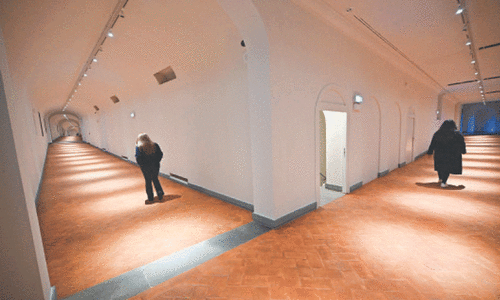NEW YORK, April 1: A rags-to-riches story of the Bin Laden family and its most famous descendant Osama bin Laden written by two-time Pulitzer Prize winner author Steve Coll was released on Tuesday.
The Bin Ladens: An Arabian Family in The American Century, is an history of the Bin Laden family. It begins with Mohamed bin Laden, who started as a bricklayer for an American oil company in the 1930s and later began his own construction business. As far as politics went, Mohamed Bin Laden appeared to have none.
The Christian Science Monitor said the book was a family biography rather than a portrait of Osama. Much is revealed about the young Osama who grew up in a family almost as secular as it was pious, “one degree separated from Mecca and two degrees from Las Vegas.” Author Steve Coll draws upon more than 150 interviews and thousands of documents.
Osama’s father Mohamed bin Laden had many wives and 54 children. Among these was Osama, born in the late 1950s to a 15-year-old mother, one of seven children Mohamed is believed to have fathered that year.
While Osama was still a child, his father died in a private plane crash with an American pilot at the controls. (Aeroplanes and the bin Ladens are oddly connected. At least eight of Mohamed’s sons and a few of his daughters took flying lessons; Osama’s oldest brother, Salem, died piloting his own plane in Texas in 1988.)
Coll describes how the Bin Ladens built their family empire by becoming the official construction company of the Saudi royal family. The Bin Ladens have grown rich over the past half century through lucrative government contracts with the House of Saud – building roads, palaces, and renovating Muslim holy sites.
After Mohamed, the next Bin Laden patriarch was the charismatic, Westernised Salem bin Laden. Salem relied on his outrageous humour and great wealth to ingratiate himself with King Fahd. Coll tells one story about Salem bin Laden making a bet with King Fahd that he could get four western women to marry him at the same time.
Coll describes the scene as Salem gathers four of his girlfriends in one room and promises them houses and lifetime financial security if they’ll marry him. (Salem lost the bet when one shocked girlfriend refused.)
Salem bin Laden was a jet-setter who loved American music and western women, but he also held conservative beliefs. When one of his sisters fell in love with an older Italian man, Salem “agonised and fumed,” says Coll.
The Bin Ladens were as diverse and conflicted as any large family, notes Coll – but this one happened to be caught between the allure of western permissiveness and the dictates of Islamic piety. Osama bin Laden became the family’s most pious member.
Coll shows us how young Osama, while in high school, grew enamoured of the Muslim Brotherhood and their aim to “replace secular and nationalist Arab leaders with Islamic governments.” In his 20s, Osama would become a major fund-raiser on behalf of Islamic fighters battling Soviet occupiers in Afghanistan.
Both the Saudi government and the Bin Laden family supported Osama in these efforts.
In 1986, Osama bin Laden used his fund-raising and organisational prowess, skills honed in the family business, to start his own brigade in Afghanistan and, later, to create Al Qaeda. As Coll explains: “Osama would make three indispensable contributions to Al Qaeda, all derived from his experiences as a Bin Laden: his emphasis on diversity and inclusion, his confidence about money and administration, and his attraction to the technology of global integration.”
Osama’s split with his family and Saudi Arabia can be traced to the first Gulf War. He vehemently opposed basing US troops in Saudi Arabia. Ironically, the Bin Laden family business helped build US military facilities. As Osama spoke out against the evils of US bases, he became persona-non-grata in Saudi Arabia.
In Sudan, the exiled Osama met several of his brothers who tried to convince him to rejoin the family business and stop his jihadist rants against the Saudi royal family. Under pressure from the Saudi government, the family eventually severed ties with Osama publicly and divested him from the family business.
Coll makes it clear that Osama Bin Laden views America much the way he saw the Soviet occupiers in Afghanistan, as corrupt imperialists ripe for defeat. Coll writes that the possibility that the bin Laden family continued to help Osama after they officially renounced him, but he finds no hard proof. Osama’s personal wealth remains a mystery that Coll – despite his efforts – is never able to quantify.
Coll writes that since 9/11 Osama’s radicalism has placed the Bin Laden family in a difficult situation: “To please American audiences, the Bin Ladens would have to seek forgiveness and denounce Osama,” while they need to be more nuanced about Osama “in the Arab world, where the family’s financial interests” lie.















































Dear visitor, the comments section is undergoing an overhaul and will return soon.